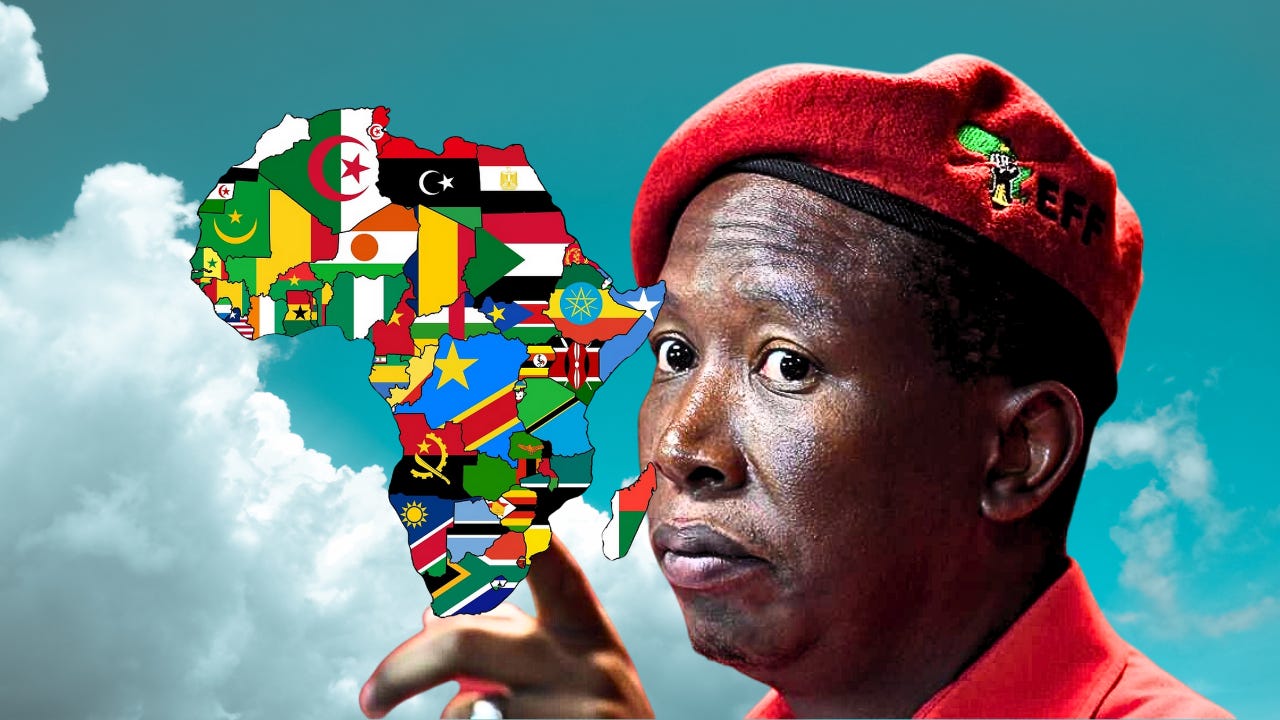Julius Malema on a 'Borderless' Africa
It really isn't that radical a concept
I will start this by saying I’m a huge fan of Julius Malema, the South African leader of the Economic Freedom Fighters (EFF). From the first time one of his videos came across my WhatsApp I've been inspired by his fearless rhetoric on African unity and resistance to western imperialism.
I recently came across a clip of Julius giving a speech about his vision for a borderless Africa. You can watch my commentary on an excerpt of his speech here.
For those who are not aware of who Malema is, here is a brief history.
Julius Malema, born on March 3, 1981, in Seshego, South Africa, is a notable political figure known for his polarizing and influential role in South African politics. He rose to prominence as a leader of the African National Congress Youth League (ANCYL) from 2008 until 2012. Malema's tenure with the ANCYL was marked by his vocal and often controversial stances, advocating for radical economic reforms, including the nationalization of mines and the redistribution of land without compensation, aiming to address South Africa's stark economic inequalities.
Now I use the word ‘radical’ because that’s how he’s often characterised but I don’t believe he is at all. This is all about perspective and the term is very subjective. A radical to the white minority in South Africa is usually a freedom fighter for the black majority. The real question is who’s controlling the narrative.
In Malema's time with the ANCLY, he faced criticism for his incendiary rhetoric, which some said bordered on hate speech. Again, this is all about perspective.
He was reprimanded for sowing division within the ANC, and his critical remarks about ANC leadership and policies led to multiple disciplinary hearings, culminating in his expulsion from the party in 2012.
In response to his expulsion, Malema founded the EFF in 2013, a political party positioning itself as a radical, leftist, anti-establishment movement. Under his leadership, the EFF gained significant traction, particularly among young voters, advocating for economic freedom and challenging the status quo. The party's performance in subsequent elections established it as a significant player in South African politics.
The fact he’s gained so much traction with South African youth shows that at least to them he isn’t some crazy pushing insane ideas. He isn’t divisive but a unifying force for that demographic who are, after all, the future of South Africa.
If there’s one thing you have to accept about Julius it’s that he’s a charismatic leader and engaging speaker. These two traits gives him that ability to mobilize and galvanize the youth. His outspoken nature and willingness to tackle sensitive and controversial issues have earned him a substantial following. Julius is seen as a champion for the marginalized and dispossessed, particularly in advocating for black economic empowerment. Of course, a prominent African figure that people listen to can never be without negative press. He’s had the customary allegations of corruption and financial mismanagement, charges of money laundering and racketeering. He has consistently denied any wrongdoing.
Despite these controversies, Malema remains a significant and influential figure in South African politics, known for his passionate advocacy for social and economic change. His ability to speak to the frustrations and aspirations of a large segment of the South African population, particularly the youth, underscores his continued relevance in the country's political landscape.
One of his main talking points has always been a united Africa under one parliament, president and currency. A single union protected by a unified army. His speech is thus nothing new to those who have followed his career. One of the aspects that really stood out for me is the idea of fear and how it’s used against Africans who support the idea of a borderless Africa. Malema says we’re told that removing borders will result in floods of illegals entering your country and that it would be an unmanageable migration. He then points out that the same people telling Africans that a borderless union would be a bad idea are from nations that are part of a borderless union ie the EU and in many respects the United States.
As Malema states, those unions haven’t resulted in people from Italy flooding into neighbouring countries. In fact, Europe has stayed pretty much unaffected in that regard in spite of the economic issues being experienced in some of the countries that are part of the EU. In short, the EU has benefitted the member nations far more than it’s harmed them. So why would people from these governments be telling Africa not to replicate what they’re a part of?
Africa never had borders prior to colonialism and we know the country borders we’ve gotten were designed to benefit the western colonial powers in terms of trade and the control and movement of resources. These are the facts and why many of the borders are in straight lines which is obviously an unnatural system. It’s not out of line to imagine the motivation for dissuading Africa from adopting an African Union akin to the European Union is because it would actually make Africa stronger.
What are your thoughts on Malema’s position? Do you agree with him or do you believe removing borders would be bad for Africa?
PAY ATTENTION




Malema is someone I really admire, I love his passion, his defiance, and his reasoning. It is true, as it is all over the world, borders were defined by conquerors, but no doubt in Africa, as it is here, local tribes have also always had their own territories. So long as borderless does not mean also removing tribal territories it should work, and is a good step toward breaking down colonialism.
Great post! The main message I agree with is: Panafricanism is the natural solution to African problems